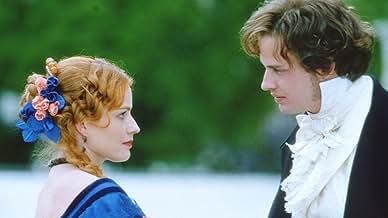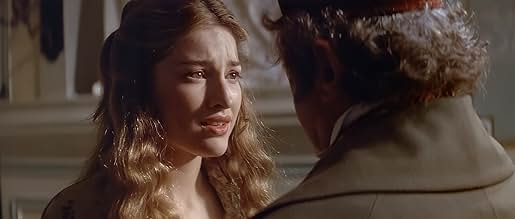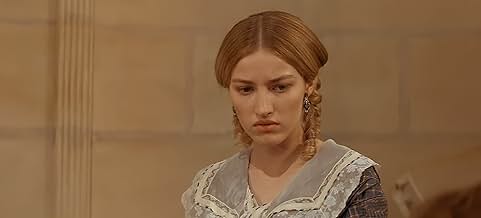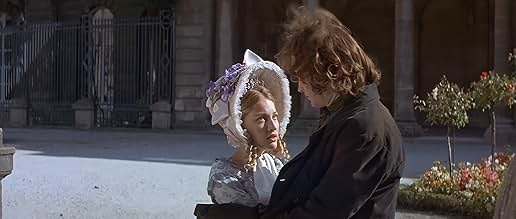Aggiungi una trama nella tua linguaWhen her sister dies in 1846, Bette moves from the château to Paris to work as a theater seamstress. She helps a handsome, starving artist. When her niece lures him away from her, she plans ... Leggi tuttoWhen her sister dies in 1846, Bette moves from the château to Paris to work as a theater seamstress. She helps a handsome, starving artist. When her niece lures him away from her, she plans a devious revenge.When her sister dies in 1846, Bette moves from the château to Paris to work as a theater seamstress. She helps a handsome, starving artist. When her niece lures him away from her, she plans a devious revenge.
- Regia
- Sceneggiatura
- Star
- Premi
- 1 vittoria e 1 candidatura in totale
Recensioni in evidenza
This fascinating tale is about a relative who is treated poorly by everyone in her aristocratic family, while they themselves live in debt, denial, and high fashion. Jessica Lange plays the title character with a cynical smirk, as though she's daring every one to call her out, yet she knows – only too well - that people are so consumed by their own personal dramas that they ignore the fine details.
Described as "the bad seed who refused to blossom", Bette is the sister of Adeline, who languidly takes her time dying, while instructing her spinster sibling as to what flowers to lay on her casket. One look at the two – Adeline in her death-bed finery and Bette, in a basic drab dress, devoid of any adornment – and it's all too evident where the balance of power resides.
Bette: (to Jenny) "How could you know? You don't know who I was sacrificed to – to Adeline. They slapped me and caressed her. I went dressed like a wretch and she like a fine lady. Adeline, the garden, peel the vegetables, Bette. She never lifted a finger except to tie her ribbons."
Describing herself as a "country peasant", Bette lives in the slums of Paris, working as a costume seamstress to the reigning burlesque star of the day, Jenny Cadine (played by Elizabeth Shue), who vainly shows off her derrière before every final curtain is rung down. Jenny puts off the ticking clock of time by enjoying the attentions of her many rich – and generous - admirers, yet one fateful day encounters her worst nightmare.
Jenny: "I'm 24 I may as well be dead."
Bette: "You were 24 years old yesterday and it didn't seem to bother you then."
Jenny: "Today, while I was walking in the park, I came across a hideous old woman, face swollen and scratched; she stank of stale wine and sweat. In her filthy tresses she had placed a beauty patch, one red camellia I knew at once who she was - she was known as Carabine, the most famous courtesan in Paris. Everyone envied her dazzling shoulders, her milky skin. She had a neck so smooth it might have been turned on a lathe. Her trademark was a red beauty patch, a red camellia."
'Carabine? Is that you?', I asked.
'No, there is no Carabine, she has left me.'
Originally a novel by French author, Honore de Balzac, this modern version boasts an international cast of talent. Bob Hoskins (Cesar Crevel), Hugh Laurie (Baron Hector Hulot), Aden Young (Wenceslas), Kelly Macdonald (Hortense Hulot), and Geraldine Chaplin (Adeline Hulot) all twist and turn in time to Bette's song of vengeance. Set in Paris, during the pre-revolutionary period of 1846, screenwriters Seifert and Tarr turn Balzac's morality tale into a microcosm of the class resentments barely simmering just beneath the pearls and petticoats of Bette's shadow world. Yet she's nothing if not flexible, as she revises her best-laid plans in the face of cross and double-cross by family and high society associates alike.
Bette: "I'll see them – all of them – in the dust! We're both daughters of the soil, and blood of the voge, and do you trust me, as a sister?"
Jenny: "Yes "
Bette: "And will you help me, as you would a sister?"
Jenny: "Yes "
Bette: "Then you will be the ax and I'll be the hand that wields it."
Surrounded by people with their own notions of power, Bette plays nonstop Powernoply until she wins all, while the French Revolution rages. She's able to play upon the passions of her tormentors and deftly manages to wreck her subtle brand of ruthless revenge upon one and all, causing adultery, a duel, physical illness, embezzlement, financial ruin, imprisonment in the Bastille, and a crime of passion - all of which sees her contentedly sewing in the grand house, dressed in her own silken finery, cooing to a child who's the product of this genteel carnage.
The story is set in the Paris of the 1840s. Bette Fischer is a middle-aged spinster who works as a theatrical costumer. She is not well-off financially and lives in a sparsely-furnished apartment, although she has more elevated social connections; her cousin Adeline, who dies at the beginning of the film, was married to the influential Baron Hulot. Bette, however, had little love for Adeline, as she was jealous of her cousin's beauty and of her marriage to a successful man. She falls in love with Count Wenceslas Steinbock, a young Polish sculptor who lives in the same apartment block, but loses her sweetheart to Adeline's pretty young daughter Hortense. Bette's dislike of the Hulot family now turns to hatred, and she plots her revenge. She forms an alliance with Jenny Cadine, an opera singer-cum-courtesan and a former mistress of the Baron, who has given her up in accordance with his wife's dying wishes. Jenny, with Bette's encouragement, tries to ruin the happiness of the young couple by seducing Wenceslas away from Hortense.
Those who are familiar with Balzac's novel will realise from the above summary that the film does not stick closely to its plot. Adeline, for example, dies at the very end of the novel, not at the beginning. The real villainess of the novel is not Jenny (who plays only a minor part) or even Bette (who is portrayed as pitiable as well as spiteful), but Valerie Marneffe, the scheming, hypocritical, gold-digging and thoroughly corrupt middle-class housewife who becomes the mistress of Hulot, Wenceslas and several other men. Valerie does not appear in the film at all; nor do Hulot's other mistresses. The film concentrates on the relationships between Bette, Wenceslas, Hortense and Jenny; Hulot, a major figure in the book, becomes less important in the film. The ending of the film, in particular, seems unsatisfactory. There is a confused attempt to tie the story of the Hulot family in with the revolution of 1848, an event that had not even taken place when the novel was written in 1846. This was probably inspired by the standard school textbook idea that the French Revolution represented a corrupt aristocracy getting its just deserts, but this interpretation seems to confuse the events of 1848 with those of 1789, and it is not one that is likely to have appealed to the conservative monarchist Balzac. The replacement of the constitutional monarchy of the amiable 'Roi Citoyen' Louis-Philippe with the regime of the unscrupulous adventurer Napoleon III was not the most glorious episode in French history.
Like some other reviewers, I felt that some of the roles were miscast. Jessica Lange, even in her late forties, was far too attractive for the role of the dried-up, embittered spinster Bette. (Balzac chose the name because of its similarity to the French word 'bete', meaning 'beast'). Bette's driving force is sexual jealousy of the beauty of other women, particularly of Adeline and Hortense, but Miss Lange's character is not a woman who would need to feel jealous of anyone. Kelly Macdonald's Hortense seemed too insipid. Hugh Laurie, in his late thirties at the time the film was made, was far too young for the role of Hulot. The character envisaged by Balzac was probably in his sixties and the father of two adult children. (Hortense has an elder brother, Victorin). Laurie, better known in Britain as a comedian than as an actor, plays Hulot as a largely comic figure, whereas in the novel he is a tragic one, a distinguished public servant ruined by his sexual passions and his financial improvidence.
The book forms part of the sequence of novels which Balzac intended as a close examination of French society and to which he gave the title of 'La Comedy Humaine'. Despite this title, most of the individual novels, 'La Cousine Bette' among them, are deeply serious rather than humorous, but the filmmakers here seem to treat the story as a black comedy. On the whole, in fact, this approach works well. The story moves along at a brisk pace, helped on its way by some witty songs. The title of one of these, 'Love is the Master, You are the Slave', is perhaps the best encapsulation one could wish for of the film in a single phrase; most of the characters are enslaved by their sexual desires. Jessica Lange may be physically wrong for the part, but she nevertheless throws herself into her role with gusto and makes a splendidly hissable pantomime villainess. Elisabeth Shue's singing voice is not really strong enough to make her convincing as an opera singer, but she is well able to convey Jenny's seductive charms. Unlike some, I found no difficulty with the fact that Bette and Jenny had American accents; both, after all, were originally peasant girls from Alsace-Lorraine (Bette's surname implies that her native language is probably German rather than French) and would not have spoken French with the Parisian accents of the other characters. There are some good performances in minor roles; Toby Stephens makes a suitably dull and priggish Victorin, a man who is the complete antithesis of his father, and Bob Hoskins is in superb form as the greasy businessman Crevel. The name is derived from 'crever', meaning to burst, and Hoskins's Crevel is a man positively bursting with his own self-importance. The film may take liberties with Balzac, but on the whole it is an enjoyable one which works reasonably well in its own right. 6/10
Bette (Jessica Lange) has always lived in the shadow of her more beautiful sister, Adeline. Adeline was always prepared for marriage and society, while Bette became a virtual servant for her family. To make matters worse, Adeline marries the one man Bette loves, the Baron Hulot. The film opens with Adeline on her death bed, listening to the confessions of her adulterous husband and spendthrift son. She makes Bette promise to take care of her family. The malicious grin on Bette's face lets us know what is coming. Bette orchestrates her revenge on each member of the family, with a cunning her family never suspected.
Part of what makes this film so delicious is that none of the characters are really very likeable, but they are all very interesting and well drawn. Even Bette is not someone you would want to welcome into your own family (although she'd make a fascinating guest at a dinner party). The only character who fares even mildly well is Cesar Crevel (Bob Hoskins). A merchant who has become the wealthiest man in Paris, he is attempting to buy his way to respectability. He is at least without pretense, even going so far as to offer 200,000 francs to see Hortense Hulot (the Baron's daughter, played by Kelly MacDonald) naked.
The story follows Bette's attempts to destroy the Baron and his family by manipulating them in their love affairs. The marriage of Hortense is expected to save the family financially, hence the appearance of Crevel. But Hortense loves the penniless Count Wenceslas Steinbach (Aden Young), a sculptor. Meanwhile the Baron has been borrowing from everyone in Paris to keep his mistress, Jenny Cadine. Bette controls all of the characters like a Grand Master.
The backdrop to the film is the decay of the French aristocratic society. Resting on the laurels of the Empire of Napoleon, oblivious to the coming revolution (the film begins in 1846), and in complete denial of the changes around them, we actually cheer for Bette as she systematically destroys the Hulot family. In a way it's the revolution carried out from within, making the fall all the more sweet.
This film is really exceptional. My only criticisms would be that (1) Elisabeth Shue as the famous actress/courtesan Jenny Cadine is merely adequate, (2) it is almost impossible to imagine the stunning Jessica Lange as the "plain" sister, and (3) the characters' accents tend to vary from time to time. The script is intelligent, clever, and realistic. The acting is very strong all around, especially by Lange. Hoskins is terrific, hitting just the right note of a materialistic man trying to be a nobleman, but not quite getting it. The locations and sets are lush and as decadent as one would expect. The direction of Des McAnuff is crisp and assured, the pace even and well controlled.
Lo sapevi?
- QuizAccording to his diaries, Alan Rickman turned down a role in this film.
- Citazioni
Mlle. Elisabeth 'Bette' Fisher: For the sake of their pleasure, men commit the most appalling crimes.
- Colonne sonoreThe Other Side of Heaven
Performed by Elisabeth Shue
Music and Lyrics by Danny Troob and Des McAnuff
Adapted from the music of Jacques Offenbach
Produced by Simon Boswell
I più visti
- How long is Cousin Bette?Powered by Alexa
Dettagli
Botteghino
- Lordo Stati Uniti e Canada
- 1.295.194 USD
- Fine settimana di apertura Stati Uniti e Canada
- 76.488 USD
- 14 giu 1998
- Lordo in tutto il mondo
- 1.295.194 USD


































